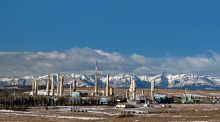
Alberta Finance Minister Joe Ceci says the prolonged cratering of world oil prices is expected to saddle his province with a $10.4-billion deficit in the next budget.
“It’s a lot. It’s a helluva lot of money,” Ceci admitted at a legislature news conference Wednesday.
“That is simply the reality of our circumstances.”
In last fall’s budget, the province projected a $5.4-billion deficit for the 2016-17 fiscal year. Ceci said the new $5-billion figure would be on top of that.
“This is the steepest and most prolonged slide in oil prices in recent history, dropping more than 70% in the last year and half,” he said.
“Projections for a quick recovery have proven wrong. This is a once-in-a-generation challenge.”
Oil and gas have long been the mainspring of Alberta’s economy, delivering multibillion-dollar surpluses earlier this decade.
But the benchmark price for oil has fallen from a high of more than $US100 a barrel in June 2014 to around US$30 today.
Every $1 drop in the average price of oil over the course of a year drains $170 million from Alberta’s coffers.
Ceci also said he can no longer promise to balance the books by 2020 and added he can’t set a new target date for when that might happen.
He emphasized the province will stick to its plans to avoid cuts in front-line jobs and critical services, to find savings where possible and to take on debt to create jobs in the construction of roads, schools, and hospitals.
“We won’t respond with knee-jerk cuts to make a bad situation even worse.”
The government won’t create new taxes, increase existing ones or introduce a provincial sales tax, he said. Nor are there plans to use any of the $19-billion in the Heritage Savings Trust Fund to reduce some of the red ink.
Alberta is now almost $19 billion in debt. Most of that money is being used for capital projects. The plan is to continue borrowing in the coming years to pay for capital and, if necessary, operating costs.
The debt by decade’s end had already been projected to hit almost $48 billion, but that was before Ceci’s $5-billion bombshell Wednesday.
Ceci said the 2016-17 budget is to be introduced in early April, but he wouldn’t give a date.
Opposition Wildrose critic Prasad Panda said no one blames the NDP for the collapse in oil prices, but the government is not dealing with it.
“Their plan is not working,” said Panda. “How they’ve responded to the situation is hurting Alberta’s economy.”
Ceci’s third-quarter update Wednesday for 2015-16 shows the government expects to run a $6.3-billion deficit this fiscal year, which ends March 31. That’s almost $200 million more than was forecast in the fall.
The update shows that the cash crunch is burrowing deeper into Alberta’s economy. Personal income tax revenue is down, while housing starts and car and truck sales are expected to continue to drop.
Oil and gas investment is expected to slow by 20% in 2016.
Alberta also expects to see a net population outflow of 6,000 to other parts of Canada this year — the first such decline since 2010.